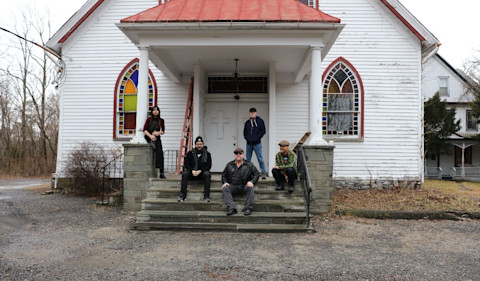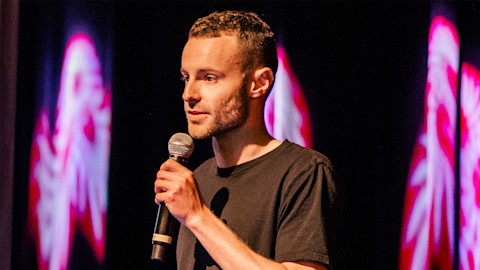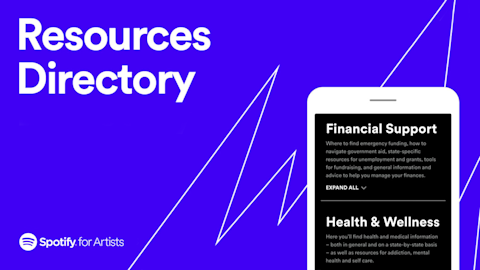John Darnielle has found the songwriting sweet spot between discipline and spontaneity.
Over the course of the 17 albums he's made as the only permanent member of The Mountain Goats, John Darnielle has earned a reputation as one of the most effective storytellers in rock songwriting. While it's easy (and fun!) to latch onto his sometimes-unusual source material—his band's 2019 album, In League With Dragons, is a heart-wrenching tale of impending doom that happens to be inspired by Dungeons & Dragons—the true power of a Darnielle song is elsewhere. It's in the beautifully flawed characters, vivid detail, enthralling narrative, and final takeaway—most often a snapshot of the human condition captured tenderly but truthfully.
It's no surprise that this English major and acclaimed author of novels (2014's Wolf in White Van was a National Book Award nominee) is good at spinning yarns. What's remarkable is the impact Darnielle’s music has on listeners. There are major boy bands with less active fan wikis. Joseph Fink, the creator of the popular Welcome to Night Vale podcast, was even moved to start a new series, I Only Listen to the Mountain Goats, in which he and Darnielle dissect the latter's LPs one song at a time. Here, Darnielle breaks down the storytelling process with a similar verve.
Spotify for Artists: Let's start broad. How does one get good at storytelling in song?
John Darnielle: For me, arriving at my process was a journey of a lot of failure. I always avoid giving any kind of advice, but I do advocate thinking of it as work—ridding oneself of the idea that as a writer you're special. You're not. You're doing work. And it's noble and great when it's good, but it is not a sign of favor from the muses. [Laughs] So developing steady work habits, and also being very self-critical without self-judging. We're not all writing our best every day, so know where your strengths are and play to those, but also try and develop the parts you're less strong at.
You've written songs inspired by everything from photos of Judy Garland (“Hospital Reaction Shot”) to tabletop role-playing games (“Clemency for the Wizard King”). How do you source inspiration, and what do you find yourself drawn to?
It's almost always spontaneous—something I run across going about the daily errands of my life. I think that comes out in the songs. It's never something I see and go, "I must tell the world about this." What inspires me is finding the depth in stuff that seems mundane. So often I'll sit down to write and have a phrase, or a title, or some detail I've written down about something I've heard. Or [laughs] photographs of people I don't know. Or pictures of monsters.
What about when you're drawing from actual events in your own life?
There's a degree of distance. I actually get sadder writing about other people than I do writing about myself. You can get pretty sentimental about people whose darker sides you're less familiar with. With yourself you want to keep a colder eye and be as honest about the person you're talking about as you can. It's more important to maintain some level of objectivity.
Nick Cave has said he keeps bank hours, and basically "goes to work" in his office every day, writing songs. Is that you, or are you more the scribble-on-napkins type?
I have an office I go to as often as I can because I love to work, but I write absolutely everywhere at any time. We're all always online, so often if I'm doing nothing, I'll go [to myself], "You know, there's probably an idea in your notes program [on your phone]—you can be writing a song instead of reading about people's politics you disagree with or whatever." People say I'm prolific, but for a songwriter to write a song or two a month is probably not asking that much. It's your job. It's work.
Do you typically start songs in a particular way? For instance, with a character, scene, or detail?
No, but there are a number of ways you can get started. In all storytelling you can ask yourself questions. If you have a good line, you ask, "Where are we? Who is this?" Or you might have a hook you're working toward, like doing a sudoku. For "No Children" [on 2002's Tallahassee], I knew I was going to get to "I hope you die," but I have the original drafts and I tried a bunch of stuff before I got the idea: What if it was "I hope" for different things, and that line is the climax?
A song is a limited medium in terms of word count, but you regularly create beloved characters who feel very real and have a big emotional impact. So... any tips?
Let them have their time in your imagination. Hang out with them sometimes: Draw pictures of them, have them write letters to each other, role-play. You have to spend time with these people. And if you have a practice with a couple of characters like that, you get a sense of how to slip inside somebody's skin. Some world-building really helps make a shorter process later. And also get in touch with your connection to the character because the character is ultimately going to be you. Just like in dreams, there are no other people—they're all expressions of you.
How often are you building toward a known outcome—an event or resolution?
Almost never. I write to find out what I am writing about. What you get from that, if you listen to my stuff and like it, is an authentic feeling of surprise. There's a sense in which telling stories is noticing there are a bunch of parts around you at all times and occasionally apprehending that you can put them together to make a machine. There are plenty of songs that don't get there and you never hear them—they just get subsumed back into the bulk lot that I'll draw from.
After the songs are written, are you sequencing the album for sound, or for storyline?
I give a 51 percent preference to vibe. I do think about those things as I go, and I might know a song I want to begin or end with, but I try to be ready for the album to tell me how its sonic story develops. Music has narrative too. The stories on my albums often don't take shape in a linear sense, but the songs are sequenced in such a way that I like the way the moods play out.
How important is it to wrap it all up—to resolve the story—by the album's end?
I don't sit down and write stories that give you a beginning, middle, and end, like a movie. I feel like if you do that, you wind up having placeholder stuff where everybody can see you moving the action across the stage, and that's what you want to avoid because you want your voice to sound natural. I want people to hear it and feel like it just sprang from my forehead. The idea is to create the illusion: guy sits down at microphone and this is what he has to say—amazing!
—Chris Martins
Popular Stories
video
How Julia Wolf Made It




